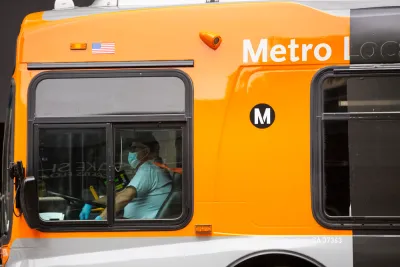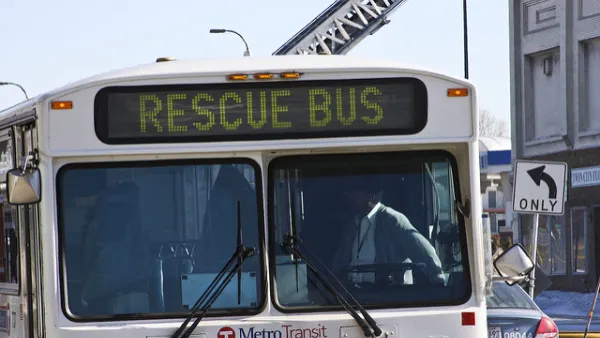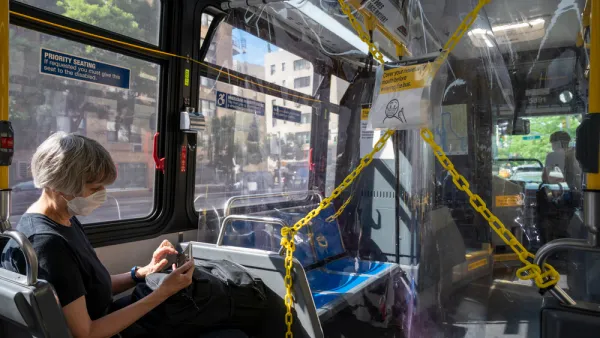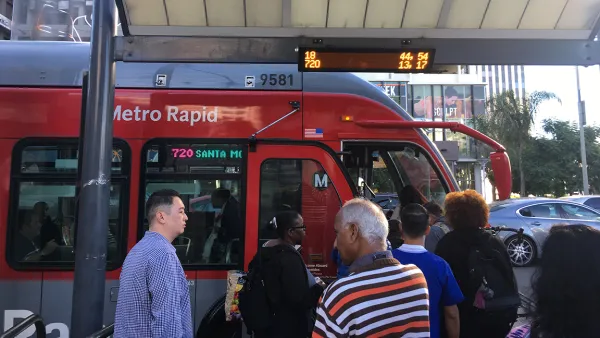Equity illuminates the light at the end of the tunnel for U.S. transit agencies, according to a recent report by the Urban Institute.

The Urban Institute and the American Public Transportation Association's Center for Neighborhood Technology this week published a new study that tracks the efforts of North American public transit agencies planning a return to regular activity.
A pair of articles published on the Urban Institute website introduce the new study and introduce key concepts for the research, such as ridership trends and equity-centering responses.
According to the first article, written by Jorge Morales-Burnett and Yonah Freemark, "Equity had a major role in how some agencies responded, and they offer lessons for how others can prioritize equity as we recover from the pandemic." The article notes a particularly salient example from Denver, where "transit ridership actually increased over the pandemic in neighborhoods with relatively low incomes (median household incomes of $35,000 or less), while it declined in wealthier neighborhoods (median household incomes of $55,000 or more)."
The article also notes that interviews with transit workers revealed how staff gained new awareness about equity during the pandemic. "One agency CEO noted, 'We recognized through COVID that transit is critical... [that it is] a lifeline service for people. We need to rethink the model,'" according to the article.
Some of the responses by transit agencies that accounted for equity included increased local service and decreased express service (particularly from more suburban areas to downtown cores or suburban tech hubs). This trend made the news on Planetizen in November 2020, when the Massachusetts Bay Transportation Authority announced plans to cut commuter rail and focus on bus service.
The second article, also written by Morales-Burnett and Freemark, digs more into the details of how transit agencies are ramping back up to normal, pre-pandemic service levels. According to Morales-Burnett and Freemark, returning to normal will require transit agencies to provide effective, equity focused transit service. The article includes a list of best practices for achieving that goal.
Not mentioned in the article, but material to the goals of transit agencies for getting back on track, is an ongoing driver shortage, which is affecting service and operations in more cities with every passing week. The issue is significant enough that TransitCenter this week Tweeted that the driver shortage is the biggest challenge facing transit agencies at the end of the second year of the pandemic—a notable shift from the funding crises of the beginning of 2020, but an existential threat nonetheless.
FULL STORY: The Ways Transit Agencies Adapted during the Pandemic Can Inform an Equitable Recovery

Analysis: Cybertruck Fatality Rate Far Exceeds That of Ford Pinto
The Tesla Cybertruck was recalled seven times last year.

National Parks Layoffs Will Cause Communities to Lose Billions
Thousands of essential park workers were laid off this week, just before the busy spring break season.

Retro-silient?: America’s First “Eco-burb,” The Woodlands Turns 50
A master-planned community north of Houston offers lessons on green infrastructure and resilient design, but falls short of its founder’s lofty affordability and walkability goals.

Test News Post 1
This is a summary

Analysis: Cybertruck Fatality Rate Far Exceeds That of Ford Pinto
The Tesla Cybertruck was recalled seven times last year.

Test News Headline 46
Test for the image on the front page.
Urban Design for Planners 1: Software Tools
This six-course series explores essential urban design concepts using open source software and equips planners with the tools they need to participate fully in the urban design process.
Planning for Universal Design
Learn the tools for implementing Universal Design in planning regulations.
EMC Planning Group, Inc.
Planetizen
Planetizen
Mpact (formerly Rail~Volution)
Great Falls Development Authority, Inc.
HUDs Office of Policy Development and Research
NYU Wagner Graduate School of Public Service




























